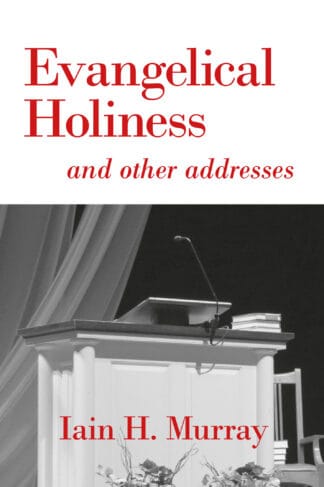Sin is Unchristian: Checks to Antinomianism
Much has been said and written about Martin Luther in recent months. A lot has ben made of the phrase that he used to characterise his understanding of justification by faith , simul justus et peccator, Latin for ‘simultaneously righteous, yet a sinner’. It certainly does help to clarify the Scriptural teaching on justification. On the other hand, it might possibly lead to misunderstanding with regard to on-going sanctification. While rejoicing in the change in our legal status, we must never overlook the moral change that takes place simultaneously with our justification. Righteousness is imputed and implanted in one act. The Apostle John in his First Epistle lays great emphasis on the evidences of moral change, highlighted particularly in 1 John 3:4-10. We see in these verses:
The Evil of Sin (v 4, 8)
Sin is diabolical. ‘The devil sinneth from the beginning’ (v8). Sin is traced back to the devil. God is the ultimate and eternal realty and his Word creates all things, it defines reality. The devil challenged the Word when he said to Eve: ‘Yea, hath God said?’ (Genesis 3:1). Our first parents believed the lie of Satan. ‘When he speaketh a lie, he speaketh of his own; for he is a liar and the father of it’ (John 8:44). The devil formed a rival world, a world of unreality. It was into that world that Adam and Eve were tempted to go: ‘Ye shall be as gods knowing good and evil’ (Genesis 3:5). They were aspiring after a liberty away from God, and they ended up in complete bondage to Satan.
Sin is lawlessness (v4). ‘Sin is the transgression of the law’. It is lack of conformity tot he law of God and as such the opposite of that love which is required by the divine law. Sin is rebellion and the cry of the sinner is ‘we will not have this man to rule over us’. Sin has no right to be.
Sin is ruinous. God’s laws are not arbitrary. ‘The law of the Lord is perfect… in keeping of them there is great reward’ (Psalm 19:7,11). Sin spoils, mars ad ruins man and God’s world, it makes man the centre of all things. The result is chaos, dissatisfaction and death. Sin is a de-creating of God’s world and it de-humanises the person. We are made for the glory of God, but we fall far short of it. Sin is an unmaking of ourselves, a de-constructing of man, it ends in death.
The Sinless One has Come to Remove Sin (v5)
‘He was manifested to take away our sins; and in him is no sin’ (v5). John is referring to the Lord Jesus Christ.
He is sinless, ‘In him is no sin’ (v5). He is the sinless One. He was holy, harmless and undefiled, without spot or blemish, he kept the law of God perfectly.
‘I delight to do thy will, O my God, thy law is within my heart’ (Psalm 40:8). ‘Though he were a Son, yet learned he obedience by the things which he suffered; and being made perfect, he became the author of eternal salvation unto all them that obey him’ (Hebrews 5:8-9).
He came to rid the human race of sin. ‘He was manifested to take away our sins’ (v5). A signal appearance of the Divine in our flesh has appeared, ‘For the life was manifested and we have seens it’ (1 John 1:2). This was God’s demonstration against sin; God’s Son was sent to rid the human race of sin, to take the world’s manifold sins clean away. John the Baptist declared, ‘Behold the Lamb of God which taketh away the sin of the world’ (John 1:29). There is the sacrificial bearing away of sin. As John Owen says, ‘there is no death of sin without the death of Christ’. But there is more to it; there is the whole idea of the removal of sin. The sin-bearer lifts the load and takes its weight uponhimself not to let it fall again on its victims but to carry it right off and make a complete end of it.
Sin is Incompatible with the Christian (v6)
‘Whosoever abideth in him sinneth not’ (v6). Union with Christ is the central doctrine of the application of redemption, we are ‘in Christ’ and we are to abide in Christ. We abide in him by faith and his Holy Spirit is abiding in us. John says that the one who abides in Christ cannot practise sin , he cannot sin deliberately, intentionally, knowingly. This is not the teaching of ‘sinless perfection’ that has been taken up by certain professing followers of Christ over the centuries though, sin will remain with us all our earthly life but it has ceased to reign in us (Romans 6:12-14).
‘Whosoever is born of God doth not commit sin; for his seed remaineth in him: he cannot sin because he is born of God’ (v9). The life of GOd is implanted in the soul and the law is written on the heart , the believer in Christ inhabits a sinless region. The channel of the new life is as pure as its source, the believer sees a light unsullied and breathes an air untainted. The union of sin and Christ in the same breath then is impossible. Sin is unnatural in the child of God, an anomaly. If Christ and sin are incompatible then to harbour sin is to dissociate oneself from him. ‘Whoever sinneth hath not seen him, neither known him’ (v6). Everyone whose life yields sin for its product cannot belong to Christ.
Application
The gospel makes full provision for holiness and no provision at all for sin. If it did not, it would be no gospel to us. ‘It is just because we are free from sin that we must fight so fiercely against it’ (Philip Ryken) , we cannot be at peace with indwelling sin like those who still belong to the world. John Owen says: ‘The choicest believers who are assuredly free from the condemning power of sin, ought yet to make it their business all their days to mortify the indwelling power of sin.’ We have died and risen again with Christ, ‘If ye through the Spirit do mortify the deeds of the body, ye shall live’ (Romans 8:13).
Men and women of religious profession living in deceit, impurity and lovelessness had from the beginning no knowledge of the Lord they profess. The whole appearance, character, and action of the Incarnate Son went to counter and overthrow the world’s sin. Our sins are threads in a great web of iniquity. Christ is taking to pieces the work of Satan, the empire of ‘the god of this world’ is in course of dissolution. The ultimate eradication of sin from God’s universe is the stated hope of the New Testament and of the believer. Our expectation is: ‘We know that when he shall appear we shall be like him for we shall see him as he is’ (1 John 3:2). There is a final regeneration of the creation itself when it will be delivered from the bondage of corruption (Romans 8:21). In the light of this, we see that ‘Every man that hath this hope in him purifieth himself, even as he (Christ) is pure’ (v3).
Are you resisting the design of the mission of Jesus Christ? Are you hoping to get to heaven at last? Heaven is only for those who are purified from their sin. It is said of that new creation, ‘And there shall be no wise enter into it anything that defileth, neither whatsoever worketh abomination or maketh a lie: but they which are written in the Lamb’s book of life’ (Revelation 21:27). The question is this: are you still in Satan’s world of unreality? If so you are, as Carl Trueman so aptly says, living ‘a silly farce played out in the shadow oft he beckoning grave.’
Of Further Interest

Description
Much has been said and written about Martin Luther in recent months. A lot has ben made of the phrase that he used to characterise his understanding of justification by faith , simul justus et peccator, Latin for ‘simultaneously righteous, yet a sinner’. It certainly does help to clarify the Scriptural teaching on justification. On the […]

Evangelical Holiness
and Other Addresses
Description
Much has been said and written about Martin Luther in recent months. A lot has ben made of the phrase that he used to characterise his understanding of justification by faith , simul justus et peccator, Latin for ‘simultaneously righteous, yet a sinner’. It certainly does help to clarify the Scriptural teaching on justification. On the […]

Devoted to God
Blueprints for Sanctification
Description
Much has been said and written about Martin Luther in recent months. A lot has ben made of the phrase that he used to characterise his understanding of justification by faith , simul justus et peccator, Latin for ‘simultaneously righteous, yet a sinner’. It certainly does help to clarify the Scriptural teaching on justification. On the […]
Latest Articles
On the Trail of the Covenanters 12 February 2026
The first two episodes of The Covenanter Story are now available. In an article that first appeared in the February edition of the Banner magazine, Joshua Kellard relates why the witness of the Scottish Covenanters is worthy of the earnest attention of evangelical Christians today. In late November of last year, on the hills above […]
A Martyr’s Last Letter to His Wife 11 February 2026
In the first video of The Covenanter Story, which releases tomorrow, we tell the story of James Guthrie, the first great martyr of the Covenant. On June 1, the day he was executed for high treason, he coursed the following farewell letter to his wife: “My heart,— Being within a few hours to lay down […]
